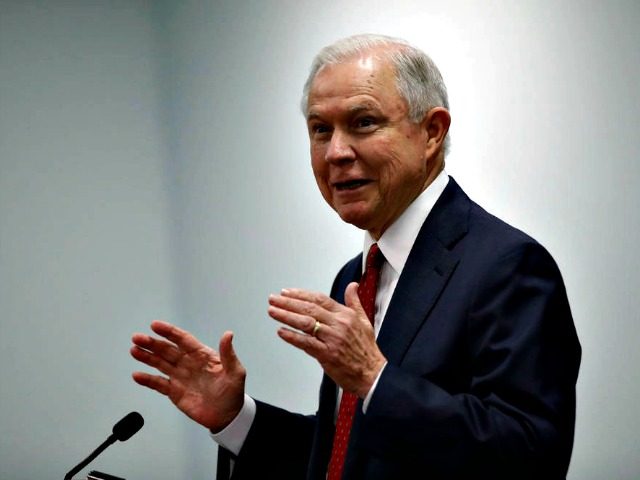Attorney General Jeff Sessions spoke about violent crime and so-called “sanctuary cities” at the U.S. attorney’s office in Philadelphia Friday, keeping on message as mainstream media speculation about his future swirled after comments President Donald Trump made Wednesday to the New York Times.
Noting rising crime rates and his department’s commitment to bringing them back down with tough-on-crime policies and restoring respect for local law enforcement, Sessions turned to reining in sanctuary cities, a signature issue of his tenure at DOJ. In his prepared remarks, he said:
I urge the city of Philadelphia and every “sanctuary” jurisdiction to consider carefully the harm they are doing to their residents by refusing to cooperate with federal law enforcement and to re-think these policies. If we’re going to stop the rise of violent crime, then we have to work together.
The American people want and deserve a lawful immigration system that keeps us safe and serves our national interest. This expectation is fair; it is reasonable, and it is our duty to meet it.
Sessions went on to cite his interactions with “angel families,” those whose loved-ones have been killed by illegal aliens who are, in turn, often protected by sanctuary jurisdictions, as an inspiration for his efforts.
The remarks came only hours after San Francisco-based U.S. District Judge William Orrick III refused to unblock the most salient tools Sessions is attempting to use to curb sanctuary cities’ intransigence. President Trump’s executive order seeking to withhold certain federal funding for jurisdictions that violate federal immigration law will, therefore, remain on hold while the lawsuit, brought by San Francisco and Santa Clara Counties in California, pends.
Orrick continues to consider the order too broad and undefined despite Sessions’s Department of Justice issuing a very specific memorandum on exactly what funding it considers the executive order to include and what activity it considers a violation of federal immigration laws.
Orrick’s ruling, however, was not the only cloud hanging over Sessions’s remarks. President Donald Trump sent the mainstream media into a frenzy of speculation Wednesday when he claimed, during a 50-minute New York Times interview, that he would not have appointed Sessions to the post of attorney general had he known Sessions would recuse himself from the Russia investigation. The president also noted the reservations he had about Sessions’s recommendation of Rod Rosenstein for Deputy Attorney General based on his hailing from heavily-Democratic Baltimore, Maryland.
White House Press Secretary Sarah Huckabee Sanders tried to put the speculation to rest Thursday, telling reporters categorically that “clearly he has confidence in [Sessions] or he would not be the Attorney General” at a White House press conference.
Seemingly in response to the speculation, Sessions began Friday’s remarks in Philadelphia saying:
It is a great honor for me, really a surprising opportunity for me at this point in my life, to serve as your attorney general. I do my best every day to be faithful to the laws and the Constitution of the United States and to fulfill goals that the President of the United States and I share.
Sessions did not take questions after his Friday address, contrasting to a raucous press conference Thursday at the main DOJ building which, despite announcing the largest-ever takedown of an online black market, saw reporters ask almost exclusively about the President’s comments.
“I plan to continue to [serve] as long as that is appropriate. We’re serving right now. What we’re doing today is the kind of work that we intend to continue,” Sessions told reporters before appearing to cut questions when it became clear no one was focused on the historic AlphaBay bust.
Rosenstein too, who also spoke on the AlphaBay investigation, was hounded by reporters for a response to Trump’s comments about his Maryland origins, but only said that he was proud to serve in his position.
This is not the first rash of headlines about Sessions’s supposed ouster. In May, anonymous sources lead to widespread reporting that Sessions had tendered his resignation over disagreements on how to defend the administration’s travel ban executive order. The rumors were either false or President Trump refused Sessions’s offer of resignation and reports of tension between Sessions and the White House did not widely appear again until President Trump’s Wednesday interview, in which he commented on a decision Sessions made back in March.

COMMENTS
Please let us know if you're having issues with commenting.